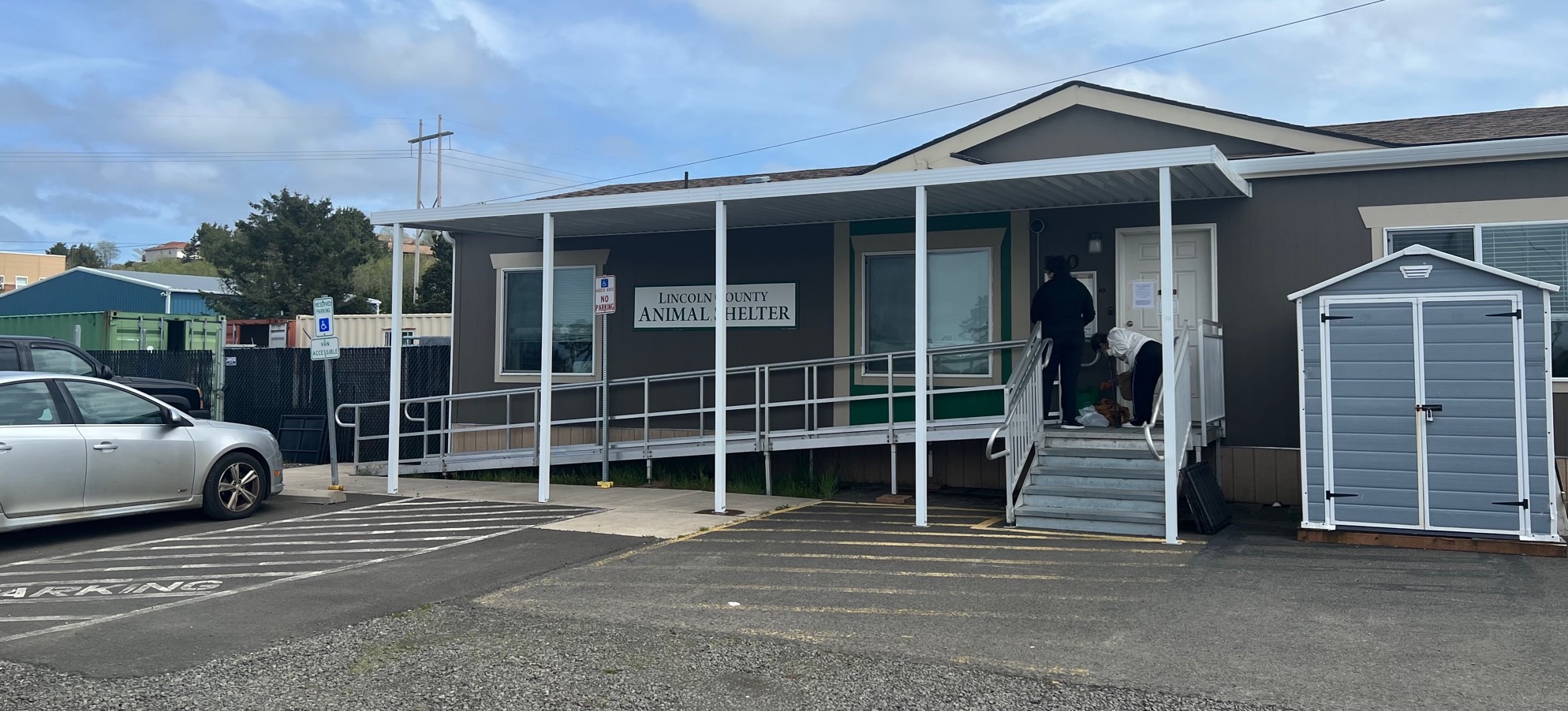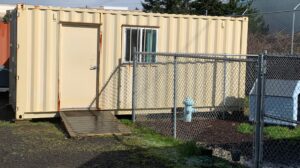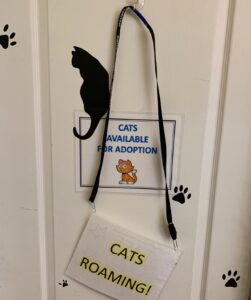
By GARRET JAROS/YachatsNews
NEWPORT – Two-year-old Texas has been passed over by a few potential adopters during his six-month stay at the Lincoln County Animal Shelter. It is not for lack of putting his best paw forward – he always does that – and then some.
Which staff acknowledges may be what has left him behind when it comes to finding the right fit for a best friend. Afterall, the shepherd mix is house-trained, will sit and lie down on command and loves people and a good game of fetch.
“His worst habit is that when he meets someone new, he wants to jump up and give them the fullest hug-greeting he can,” says shelter manager Sara Wynveen. “That has cost him a couple of potential adopters. He might be jumping all over you, cleaning out your nostrils and all that good stuff. He doesn’t show well because of that.”
While Texas’ tail-wagging exuberance combined with his strength and love of adventure means he needs someone special to come to his rescue, there is no doubt among staff and volunteers that the reward will be getting a “good boy.”
“He does great out on his walks and I would take him home in a heartbeat, but of course my household is full,” Wynveen laughed.

Awaiting a new home
The county animal shelter, which is part of the sheriff’s department, has been making the best of a difficult situation since its old location was condemned because of toxic mold and demolished in 2019. It worked for a time out of its emergency trailer and some fairground facilities until moving to its undersized and supposed temporary location that is turning out not to be so temporary.

It was anticipated the shelter would be in the double-wide manufactured home and a few pre-fabricated sheds and storage containers for a year. But then came the pandemic and wildfires. Last year Lincoln County purchased two acres of land in the Waldport Industrial Park to build a 4,000- to 5,000-square foot shelter it hoped would open in the fall of 2024.
“But they just did the geo tech and we got some news that means it is going to take longer,” Wynveen said. “So if we are up and operational by the end of next year (2025), I would be so pleased. They have a team within the county working on it.”
The current shelter has capacity to house nine dogs in individual kennels, but because there are 12 to 14 dogs on any given day, compatible dogs share kennels and very small dogs are sometimes boarded inside the office. Making space for dogs has meant less space for cats, which have 10 individual housing areas.
Adopting animals is an incredibly important aspect of being a shelter that does not euthanize animals, Wynveen said.
The shelter also has a legal obligation to serve as an impound facility for nuisance dogs running free as well as for animals confiscated during court cases. That can include animals that are victims of abuse or neglect, an owner who is arrested or an accident where someone dies who has no next of kin.
“Adoption is our way of making sure that animals that become our property get to go find a new home,” Wynveen said. “We need them to get animals moving. So adoption I would say is the most important thing we do, but from a law standpoint, not our first priority.”
The shelter will bring in somewhere between 25 and 35 dogs a month, but 70 to 80 percent of those are strays eventually picked up by their owners. There are currently three dogs available for adoption, several cats and more of both in the pipeline.

“We have other dogs that belong to us that have been through the behavior vetting process but they are still waiting for spay and neuter,” Wynveen said. “We’ve run into a real slowdown with the veterinarians and spay and neuter appointments so we are working on ways to match those dogs with potential adopters prior to their appointments. But we don’t have a robust way to do that online yet.”
There are 10 dogs staying at the facility and two more in foster care. Three kittens are also in foster care. Before going out for adoption the animals go through behavior and veterinarian testing, are spayed or neutered, updated on vaccines and micro-chipped so they can be identified if lost.
While the shelter does not euthanize adoptable animals, it does not qualify as a no-kill shelter because it does not meet the required threshold percentage.
“That being said, they count owner-requested euthanasia against the shelter’s percentage,” Wynveen said. “So no we are not no-kill and I hate the term anyway. Nothing like having to euthanize an animal and people saying we are killing it.”
Animals are never euthanized for treatable or manageable medical conditions, treatable behavioral issues or time and space constraints. An example is little Pedro Pascal, an 11-year-old terrier mix who was brought in by his owners who requested he be put down because of aggressiveness. But after visiting with him, staff determined he was only suffering from medical issues they are now taking care of so he too can find a new home.
It is a far cry from when Wynveen came on board in 2007 as a kennel assistant and the shelter was a high-kill facility where, she said, anything that even looked like a pit bull was euthanized.
“So we have put our blood, sweat and tears into becoming what (prior to losing our housing) was a really, really progressive, awesome municipal animal shelter,” Wynveen said. “We want to get back to where we were, we don’t want to lose the reputation we had with the community.”

Biggest challenge
Not having a proper-sized facility built specifically for animal care is the overarching issue for the shelter, whose operating costs were just under $700,000 for fiscal 2023-24. But staffing is the biggest current challenge because the cost of hiring people has risen so sharply and the tax rate for the countywide animal service district has stayed at 11 cents per $1,000 assessed property value since 2009.
 “So right now, we have two full-time positions in the animal services district we cannot fill,” Wynveen said. “We are also short a staff member that we are trying to fill, and another leaving in April, which will leave three people including me to run the shelter.”
“So right now, we have two full-time positions in the animal services district we cannot fill,” Wynveen said. “We are also short a staff member that we are trying to fill, and another leaving in April, which will leave three people including me to run the shelter.”
In a perfect world they would have five animal care specialists, a manager and three animal services deputies on the road.
The shelter also relies on volunteers who visit with animals, walk dogs and do laundry, dishes and other cleaning duties. But because there’s just not room in the facility, even the number of volunteers has been pared back.
All of which has led to limited walk-in hours for the public. While the shelter is open from noon to 4 p.m. Tuesday, Wednesday, Friday and Saturday, beginning Monday visits will be by appointment only. Even now, appointments must be made to visit adoptable dogs.
“I know that accessibility is a huge issue here,” Wynveen said. “The fact that we don’t just let people go back with the dogs. I understand that is slowing down the adoptions. I hear that from people. But we really do not have another option in this facility.”
Shelters full nationwide
In 2023 the percentage of stray dogs in Lincoln County increased by 35 percent and the number of dogs in protective custody increased 15 percent, said Wynvean who added that nationwide there are now more stray dogs than dog owners.



During the pandemic spay and neuter surgeries were stopped for nearly 10 months, which created millions of animals that otherwise would not have existed, she said. And then in 2021-22 there was a big increase in people giving up their dogs. Many of the so-called “Covid puppies” were not properly socialized, trained or cared for, Wynveen said, and when people went back to work there was a tsunami of dogs that had never been left alone.
The numbers of big and hard to manage dogs – “large, rowdy, jumpy, mouthy dogs,” which have always been the bane of animal welfare shelters in shelters, has exploded across the U.S. and Canada, Wynveen said.
“In Oregon we were doing great before Covid,” she said. “We were doing amazing. Even our shelter. We were able to transfer dogs in from out of state from high-kill shelters. So that was wonderful. But now that everybody is over capacity and there are so many dogs and so many people looking for new homes for their dogs…”
The shelter used to be able to depend on non-profit partners to transfer some dogs to other facilities. Today it is lucky to transfer a few a year.
How to help

The best way to help the shelter is by spaying and neutering pets, and by not letting dogs get loose because if they get picked up, even for a few days, it takes shelter space away from other animals, Wynveen said. People can also donate to the shelter’s new building and medical trust funds.
Anyone interested in adopting a dog needs to fill out an application and make an appointment.
The cost of adoptions are: puppies $250; adult dogs $175; senior dogs $125; kittens $100; adult cats $75; senior cats $50.
“And we run specials all the time,” Wynveen said. “We want to make it as easy for people to adopt as possible but given the cost of caring for an animal these days we also want people to understand what they are investing in.”
-
For more information visit the Lincoln County Animal Shelter website or call 541-265-6610.
- Garret Jaros is YachatsNews’ full-time reporter and can be reached at GJaros@YachatsNews.com



I think another reason shelters are full is the fact that having a pet has become very expensive as has everything else and people are having to make hard decisions. The dog food I buy has risen substantially in the last 3 years.
Yes the food has gotten more expensive but I do without some things to compensate. The pet food industry does its best to keep profits the first priority not what’s best for the little souls that have adopted me. Donate food, little beds, money and your time to your local humane society. You see advertising from the A.S.P.C.A. on TV a lot. Sad songs and wanting just 3,000 more donors so the president there makes his million dollar salary.
This is truly heartbreaking. I’m curious if you have someone that works on raising funds for this agency.? And I agree getting your pets sprayed and nurtured is the best defence for the over population in shelters. Thank you for all you do.
So sorry that the new shelter in Waldport is delayed, some of us are so looking forward to volunteering up there. But nothing to do but wait. Thanks for doing all you do at the current shelter, and how can folks help?